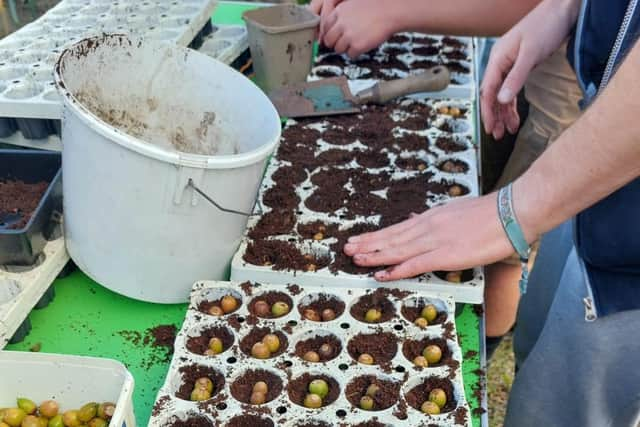Community tree nurseries branch out to Lancaster
and live on Freeview channel 276
Currently, trees are being grown at Lancaster University as part of the HEAL project – Health & Environmental Action Lancashire – run by Ribble Rivers Trust, which aims to improve the health and wellbeing of communities most in need through involving them in environmental action in places where the environment will also benefit.
The nursery is at the ECOHub run by Green Lancaster and involves RRT working with the Lune Rivers Trust alongside students and The Bay, a nature and wellbeing programme for people living in the Morecambe Bay area.
Advertisement
Hide AdAdvertisement
Hide AdThe seeds were collected mainly by RRT staff from ancient woodlands around the North West and Yorkshire Dales so that the trees have local provenance.


Volunteers were shown how to extract the seeds from berries, sow seeds, nuts and acorns, pot out seedlings and keep them watered. The resulting saplings will stay at the nurseries until they’re between 40-60cm tall.
Eventually, they will create new woodlands, mainly in the RRT catchment area, in locations where they will benefit the environment, people and wildlife the most.
Ellie Brown, RRT’s strategic evidence and geographic information system manager, said the project was working well: “We’re providing volunteer opportunities which allow people who are not as physically able or can’t travel, a more local and less strenuous activity they can do to improve their health and the environment. We’ve attracted a new range of volunteers as a result of this project.”
Advertisement
Hide AdAdvertisement
Hide AdMore than 50 volunteers from children to pensioners have participated in the scheme, funded through the Green Recovery Challenge Fund, with many saying how therapeutic, mindful and relaxing it’s been.
So far, 4,500 seeds have been planted across the three nursery sites.
Tree species include English oak, hazel, hawthorn, blackthorn, crab apple, holly, wych elm, grey willow, elder, dog rose, field maple, alder, silver birch and hornbeam.
All these native species provide important habitats for wildlife, help soak up water to reduce the risk of flooding, and create a sense of place. They also help remove carbon from the atmosphere and reduce the negative impacts of climate change.
For further information about Ribble Rivers Trust, visit www.ribbletrust.org.uk or contact Ribble Rivers Trust on 01200 444452 or via [email protected]